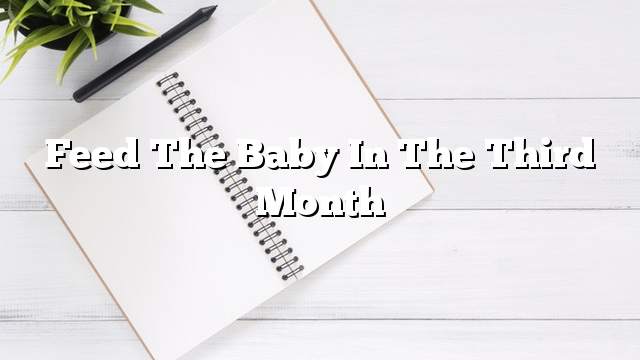Feed the baby in the third month
The mother’s milk or industrial substitutes provide the full nutrition of the child during the first three months of life. The nutritional appetite and needs of each child vary from day to day and from month to month. As the child grows, his or her food needs change; the number of feeds decreases and the amount of milk consumed per feeding, It is worth mentioning that the digestive system of the child at this stage is still in the development and development; so should avoid the introduction of food to the child’s food at this stage, and be fully dependent on milk.
Signs of hunger in the child
The mother can know the time of the child’s hunger by observing a set of signs, and in the following we mention some of them:
- The baby tends toward the breast or milk bottle.
- Sucks his hands or fingers.
- He opens his mouth, and comes out of his tongue and whispers his lips.
- Crying; crying may be a sign of hunger, but if the mother waits for the child to feel very upset to feed him, it may be difficult to calm him down.
Signs of good nutrition for the child
The mother can be assured that the child feeds well by observing the following signs:
- It seems alert, energetic, and energetic.
- Getting heavier.
- Grow and develop its capabilities.
- Breastfeeds six to eight times a day.
Bad nutrition signs for the child
The child has a set of signs that he is not feeding enough;
- Do not feel comfortable even after breastfeeding.
- Constantly screaming and disturbed.
- It is important to note that many children spit a small amount after eating or during burping, but the child should not vomit after breastfeeding; this can be due to overfeeding, but vomiting after each feeding may be a sign of allergies, or A digestive problem, or other problems that need medical attention.
Feed the baby with breastfeeding
In the third month, the child needs 7-9 daily feeding every two and a half hours to three and a half hours. It is worth mentioning that breast milk production increases or decreases naturally depending on the child’s need. On enough breastfeeding, and we mention the following:
- The breast becomes more soft after feeding, because the baby empties its contents of milk.
- The baby looks relaxed and relaxed after feeding.
- The child continues to gain weight. The natural increase in the child’s weight is from 170 to 226 grams per week during the first four months.
- The baby changes at least six diapers a day.
Feeding the child with formula milk
If the child is breastfed, he needs 74 ml per 0.45 kg of weight per day. These figures are not fixed; they provide the average needs of the child, which vary depending on his / her needs; Other days, if the child is hungry, he quickly finishes the milk and looks around for more. In this case, the child can be given 30-60 ml of milk per serving, but be aware that the baby does not breastfeed more than 945 ml of formula milk Per day; because children who breastfeed milk The industrial tend to become more weight than their peers due to excessive breastfed, and to avoid over-feeding should come out slowly milk from the bottle in the form of points and spills quickly.
Benefits of breastfeeding
Breastfeeding is the best nutrition for newborns. The American Academy of Pediatrics recommends breastfeeding and is fully dependent on the first six months of a child’s life, after which solid foods are introduced and continued to breastfeed during the first year or two of the child’s life. The first six have many benefits for both mother and child, and these benefits include the following:
- Mother’s milk is the ideal food for the child because it is easy to digest and is an important source of energy and nutrients in children between the ages of 6-23 months. Mother’s milk provides the full needs of the child up to the age of six months and more than half of the child’s energy needs (6-12) months, and one-third of the energy needs between 12 and 24 months.
- Contains antibodies that help protect the baby from a wide range of infectious diseases; including diarrhea, respiratory infections, and gastrointestinal infections.
- The research shows that breastfed children are less likely to develop certain diseases, including diabetes, high cholesterol, asthma and allergies.
- Breastfeeding reduces the risk of being overweight or obese.
- Breastfeeding helps to burn calories and shrink the mother’s uterus. Breast-feeding mothers are more likely to regain weight and normal shape of their bodies faster.
- Reduce the risk of ovarian cancer and breast cancer.
- Breastfeeding meets a range of emotional needs of the mother and baby. Direct contact between the mother and the infant enhances their emotional bonding, and helps the new mother feel confident in her ability to care for and provide full nutrition for the new baby.
- Breastfeeding is a natural way to prevent pregnancy. It has a hormonal effect that prevents pregnancy in many women.
